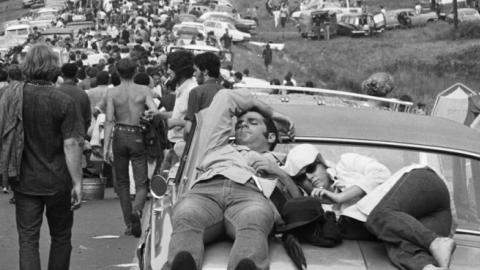Whoever has driven north on the New York State Thruway must remember the exit at Harriman, which leads to Route 17 westbound toward the scenic Catskill Mountains. Once famous for providing access to the magnificent Jewish resorts of the area, Route 17 and its offshoot, Route 17B, are now better known for having been impassable on a certain weekend in August 1969—that bucolic season when the Kaatskills, as they were called by the old Dutch settlers, seem half dissolved in the haze.
Among the travelers that weekend was a simple, good-natured fellow of the name Hip Van Winkle. A native of Ulster County, he was descended from the Van Winkles who sailed with the first Dutch patroons supplied by the Dutch West India Company in the 1630s, only to squander that opportunity through an insuperable aversion to productive labor. That same ungodly sloth was inherited through the Van Winkle line for the next three centuries. But not by Hip. Energetic, hard-working, resourceful, he seemed destined to build a business, sustain a farm, or perhaps invent a better way to trap the venomous copperheads that lurked throughout the region. But that destiny was thwarted by his wife, a relentlessly mellow Vassar dropout who, despite calling herself Flower Child, never ceased to find fault with Hip for his “uptight” tinkering, puttering, and fixing of things in their ramshackle farmhouse.
To these struggle sessions Hip had but one reply: Dropping whatever task lay at hand, he would spread his arms in a gesture of peace, and escape to the local head shop. It was there, well toked on Acapulco Gold and attempting to meditate through a blustery spring afternoon, that he first heard about the Woodstock Music and Art Fair, which was being held not in Woodstock, where the townsfolk were already experiencing a surfeit of hippies, but in Bethel, several miles to the west. Hip’s first thought was to skip such a time-wasting event, but he was persuaded otherwise by Nick Veda, the proprietor of the head shop, who embodied the spirit of the times by the way he inhaled the smoke of the fragrant weed, allowed it to fortify his blood, and then emitted a placid stream that slowly coiled up to unite with the earth’s atmosphere.
Returning home, Hip told Flower Child about Woodstock, and for several weeks was able to counter her nagging to “stop doing and be” with the riposte that what he was doing was preparing to be in Bethel in time for the opening act. And so they were: On Friday, August 15, when the traffic on Route 17 was backed up to the Thruway, and thousands of festival-goers were abandoning their cars on Route 17B, the little Winkle family—father, mother, and two small children—were safely ensconced in an army tent on the high ground of Max Yasgur’s sloping pasture. As the sun set and the pasture filled with blissed-out pilgrims, Hip agreed to mind the children while Flower Child sailed forth in tie-dye skirt, crushed velvet tunic, and trinkets of coral and turquoise.
It was a long evening. The baby girl, Stardust, spent hours gazing beatifically at the passing forest of legs, but the toddler, Hip Junior, did not settle until ten o’clock, when Ravi Shankar was playing a hypnotic raga. By then it was raining, and as Hip sat under the flap of the tent, smoking Acapulco Gold and watching the water run down the sides of the tent and into his carefully dug trenches leading down the slope, he silently reminded the absent mother of his dry, sleeping children that there were worse things than being married to “an anal-retentive Boy Scout,” as she frequently called him.















